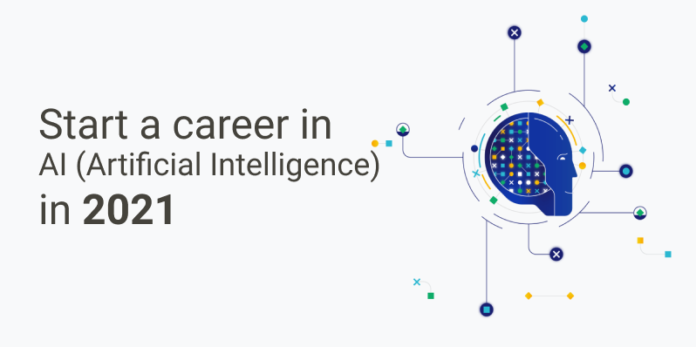Whenever you hear the word Artificial Intelligence, terminator & robots, is what hits your mind…Right? Well, we are far away from those days but still, we have come a long way in the field of artificial intelligence. Self-driving cars, digital assistants like Siri or Alexa, Chatbots are all some real-life powerful and interesting examples of Artificial Intelligence.
And it’s not even the beginning; there is so much advancement to be made in this field. Many scientists and entrepreneurs believe that Artificial Intelligence is going to be bigger than the internet revolution.
Despite the overwhelming growth in the field of Artificial Intelligence, we are yet to see small companies introducing Artificial Intelligence initiatives. Although many people believe that Artificial Intelligence is going up so many job opportunities but that is not true. AI is here to generate jobs and not to destroy them.
Artificial Intelligence Jobs Reality
Artificial Intelligence is proclaimed to create 2.3 million jobs by the end of 2021, expected to a net gain of 500,000 potentially new jobs. And in the light of growing technology, job opportunities for Artificial Intelligence workers are bound to see a definite rise.
- According to International Data Corporation (IDC), Artificial Intelligence jobs are supposed to grow by 16% this year itself.
- Plus more than 85% of Artificial Intelligence experts believe that the industry has become more diversified in recent years.
Gradually all the organizations across all industries have started to adopt Artificial Intelligence and Machine Learning. So, it’s crystal clear that the demand is going to be huge for skilled professionals in the coming years.
How to Start your Career in Artificial Intelligence
As a Fresher:
- A Bachelor’s degree in the following subjects-
- Computer Science
- Information Technology
- Mathematics and Statistics
- Finance
- Economics
Apart from it, one must have great problem-solving, analytical and communication skills, creative thinking, and industry knowledge. Since artificial intelligence is on full trend these days, it is advisable to take up specialized training programs because a bachelor’s degree will only help you to get an entry-level position.
A Master’s degree-
If you want to get into higher positions and leadership roles, then you need to have a Master’s degree or a Ph.D.
A Master’s degree in artificial intelligence or a Master’s degree that offers advanced computer science education with a specialization in artificial intelligence is necessary to weave an amazing career in AI. The master’s program focuses on developing required skill sets and allows you to work on real-world problems and application domains.
A working professional –
To become an AI engineer you need to learn the latest skills and must have deep knowledge about the latest technologies. Artificial Intelligence engineers are not just skilled professionals they possess in-depth practical and theoretical knowledge of almost everything in their domain.
Having a practical approach and fine-tuning your technical skills towards these technologies is a must. And having add-on AI certifications will help you gain an edge over other competitors while seeking a job.
Also read: 18 Time Series Analysis Tactics That Will Help You Win in 2020
Skills Required To Become an AI Engineer
Professionals/Beginners looking to start a career in Artificial Intelligence must have these skills.
Technical Skills
- Programming languages –

Having in-depth knowledge of programming languages like R, Python, Java, and C++ is vital for anyone who wants to become an AI engineer. Being skilled in programming languages like R, Java, C++, and Python is critical. It will help you understand the concepts like data structures and classes. And believe me, learning one programming language is not enough, you must know more than one programming language. It will be very advantageous for you as organizations these days focus on individuals having broad skill-set.
- Statistics, Linear Algebra and Calculus
To grasp how machine learning algorithms work it is important to understand statistics. Mean, standard deviation, and Gaussian distributions, are going to come up a lot. A solid understanding of various statistical concepts like probability and models like Hidden Markov models, Naive Bayes, and Gaussian Mixture models is important.
Furthermore, one needs to be familiar with matrices, matrix multiplication, vectors and should have an understanding of derivatives and integrals.
- Natural Language Processing (NLP)
Natural Language Processing is basically a sub-field of artificial intelligence. In a nutshell, NLP is something that gets the computer closer to a human-level understanding of language and enables computers to understand and process human languages.
This covers two major areas of work like computer science and linguistics and chances are that you might have to work with video, audio, or text. That’s why it is essential to have a good working knowledge of libraries like Gensim and NLTK and techniques such as word2vec, sentimental analysis, and summarization.
- Neural Network Architectures
When a particular task gets too complicated for humans to code, then machine learning comes into the picture. It might surprise you but recent advancements in machine learning have enabled machines/computers to perform tasks that are too unrealistic for the human mind to comprehend.
Neural networks are a proven way of addressing problems like image classification, speech recognition, and translation.
Non-Technical Skills
An AI engineer is liable to explain the important events and results to stakeholders, management, and individuals who don’t have much technical skills. To become a successful Artificial Intelligence engineer it is important to have some skills as well.
- Industry knowledge
AI professionals work in different industries and backgrounds and they should have in-depth knowledge regarding the industry they are working in as it will help them to understand things in a much better way and it will be easy to pin out the pain points of the industry.
- Communication Skills
Explaining concepts like machine learning and artificial intelligence to people who don’t have technical knowledge about the subject matter is not easy unless you can communicate in simple language. Having good communication skills will be very much beneficial when one will need these technical concepts.
Roles and Responsibilities of an Artificial Intelligence Engineer-
An artificial intelligence engineer has tons of responsibilities over his head such as:
- Researching appropriate machine learning algorithms and Transforming data science prototypes.
- Developing machine learning applications when required.
- Working closely with the robotics team and electrical engineers.
- Doing ML tests.
- Training systems when required.
- Selecting suitable datasets and data representation techniques.
These are the overall roles and responsibilities an artificial engineer carries out. However, the roles and responsibilities vary depending on the level of your expertise.
Conclusion
We are living in an era where more and more professionals are looking to upgrade to the new-age tech jobs. Artificial Intelligence is making giant paces, and this is the best time for people who are looking to make a career in AI. In coming years more and more roles will open up in the field of AI.








